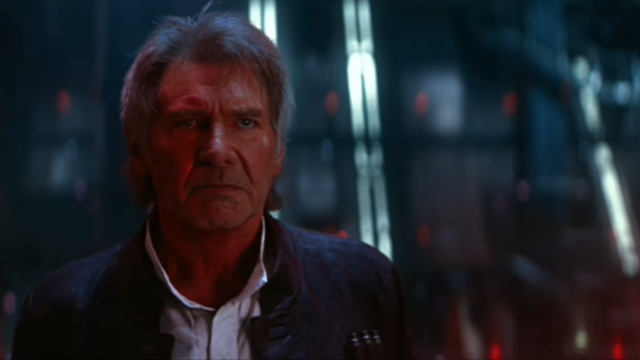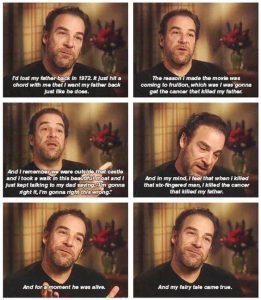In discussion of the movie Star Wars: The Force Awakens, beloved Soluter The Ploughman remarked that he really connected with the movie emotionally because he could empathise with Han Solo’s relationship with Kylo Ren; he considered the movie an articulation of a parent’s fear of their child becoming something evil. I thought this was interesting because I have basically no emotional connection to the movie whatsoever and it feels empty and devoid of meaning to me. It’s entirely possible, of course, that I do not have the emotional sophistication to imagine the feelings of a parent, or even that feelings like that are entirely out of the reach of non-parents. I think it’s also possible that Ploughman is able to use the icons the movie uses to project his own feelings towards his own children onto the movie.
This came into my Facebook Memories last week – it’s an interview with Mandy Patinkin, star of The Princess Bride, describing how he approached playing Inigo Montoya. Inigo is motivated by revenge on the man who killed his father, so Patinkin chose to project his feelings towards the cancer that took his own father onto the character. It pops up in my memories because I posted it to a friend’s wall on her birthday as a prank/present because she loves the story. For reasons that I assume are obvious, when it appeared on my wall this year, I burst into tears rereading it. If someone else were writing this essay and I were the one reading it, this is where I’d expect the author to say “Now I understand how he feels”, but that’s not true in the slightest – in fact, it’s all backwards. I always understood how he felt – I always liked this story, was always moved by Patinkin’s sad acceptance of the reality under his admission of play, always understood why someone would want to take revenge on the thing that killed their father.
And this story didn’t make me suddenly like The Princess Bride or Inigo’s story – it deepened my understanding and appreciation, of course, but I always sympathised with Inigo. “I want my father back, you son-of-a-bitch,” is one of the great moments of cinematic ownage- the movie’s characteristic wit and wordplay turned towards a moment of cruelty. Rugen had no chance of getting out of this alive. If anything, my ability to understand Patinkin’s feelings is currently lessened – my father is still alive, of course, but I’m not sadly accepting the situation and my automatic impulse is outrage at the very idea*. I’ve always been quietly insulted whenever a parent says I can’t understand what it’s like to be a parent because I do, in fact, have a variety of life experiences that I can use as an approximation (I did not spend the larger part of a 36-hour day working in a potato cake factory only to be told that I don’t know what it’s like to be tired), and my capacity to imagine and feel others’ emotions is quite vast.
*My second response is that Patinkin’s state of mind is probably where I’ll end up one day.
It’s not that Ploughman is wrong for liking The Force Awakens or for building off what the movie gives him to have a unique emotional reaction – or even that his particular emotional reaction won’t factor into my next viewing of the film – it’s that I don’t feel I should have to have kids in order to enjoy a film. I think this is an interesting question – where is the line between a work that a viewer can project on and a work that invites connection? How much is that actually an issue? I would never defend Mass Effect as high art or as anything other than my own personal escapist fantasy (no matter how hard I’ve tried), but there are so many individual lines in it that have stuck with me over the years.
There’s a late optional conversation you can have with Mordin in which he describes the lack of any culture in the alien bad guys with horror. You can remark how strange it is that Mordin, a scientifically minded man who has never shown the slightest interest in art, is offended by its lack, to which he responds: “Personal interest negligible. Sang a little. Multispecies productions for cultural exploration. Gilbert and Sullivan. Always had me doing the patter songs. But: not about me. Cultural artistic expression reflects philosophical evolution, interest in growth, perspective, observation, interpretation. Suspect you won’t see any art in Collector Base. Culturally dead. Tools for Reapers. Worse than Geth.” The bolded section is delivered in an offhand way that has always stuck with me – of course this matters even if Mordin has no emotional investment because the picture is bigger than his feelings. I have often considered this with things ranging from sport to celebrity gossip, perhaps in detriment to my own self-esteem.
The question is, am I being pretentious for finding something in a bang-bang-shooty video game or pretentious for dismissing something in a cheesy space movie? I feel like a work has to have a certain amount of substance to it, even if that substance isn’t immediately obvious.



